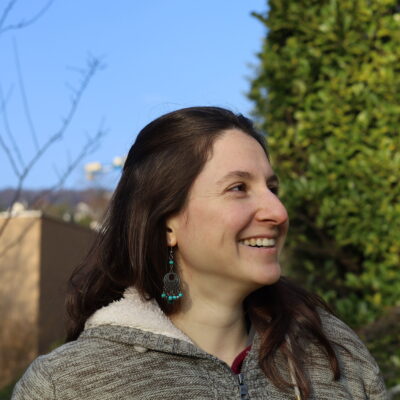Student Spotlight: Alexandra Gallyas Sanhueza

February 27, 2023
Alexandra Gallyas Sanhueza is a doctoral candidate in electrical and computer engineering from Santiago, Chile. She earned her bachelor’s degree at Pontificia Universidad Católica de Chile and now studies techniques which can reduce noise for electromagnetic signals at Cornell under the guidance of Christoph Studer.
What is your area of research and why is it important?
Imagine trying to have a conversation in a very noisy room. The communication will be inefficient as you will be asking the other person to frequently repeat, and you may have to yell in order to be heard.
When you use your cellphone, electromagnetic signals are transmitted through the air. As the signal travels, there are multiple sources of echo, distortion, interference, and noise. Thus, the signal that is received at the cellphone tower (base-station) is not “clean” anymore, and digital signal processing is all about trying to reconstruct the message that was originally sent.
During my Ph.D. I have developed new de-noising techniques, which can reduce the noise by “listening” only to the directions where the signal is coming from and by ignoring other directions from where there is no signal contribution but just noise.
The 5G standard already supports base-stations with an array of antennas (instead of a single antenna), giving base-stations the ability to separate signals coming from different directions.
What are the larger implications of this research?
The noise reduction that we achieved can be used to reduce the transmit power and save energy (in a quiet environment you can easily transmit a message just by whispering), or it can be used to increase the data rate (if your message doesn’t get lost in the noise, you don’t need to repeat as often and you can send more information per second).
Increased data rates can enable new wireless applications, while we all know how important it is to reduce the power consumption.
What have you gained by participating in the NextGen Professors Program?
I would highlight the opportunity to meet a community of researchers that are in a similar situation, thinking about their future careers without having many resources or role models. We share and learn from each other as well as from guest speakers, discussing topics as broad as the direction of one’s career or as specific as strategies for getting a strong recommendation letter.
How has this program been helpful in working toward your professional goals?
It has helped me think about my upcoming job search, clarify the alternatives, and decrease the anxiety about my future career path.
What are your hobbies or interests outside of your research or scholarship?
I have developed a taste for series or audiobooks about fraud as I try to understand what makes us vulnerable to getting fooled by others or by ourselves. I also enjoy spending time outside (especially when it is not winter) trying to spot as many animals as I can (animal tracks also count!). I love cooking (especially baking), and spending time with friends.
Why did you choose Cornell to pursue your degree?
My partner started a Ph.D. at Cornell first. When I finished my undergrad program I moved to Ithaca, before being accepted to the Ph.D. program. I worked freelance in an electronic design project, as a waitress, and then doing electronic design and maintenance in Cornell’s particle accelerator lab. As a Cornell employee I was allowed to take classes for free, and that is how I met my current Ph.D. advisor.
